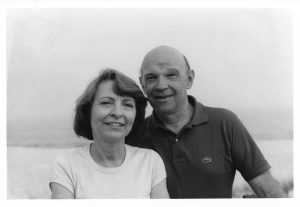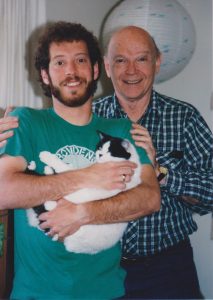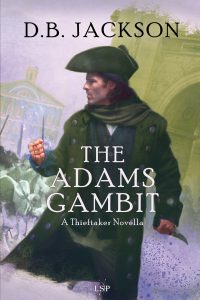 I have conversations with my father all the time. Literally every day. Which is kind of remarkable given that we lost him to leukemia twenty-five years ago.
I have conversations with my father all the time. Literally every day. Which is kind of remarkable given that we lost him to leukemia twenty-five years ago.
There are, for me at least, people in my life whose voices I have internalized, made part of my subconscious. None of those voices is more prominent, more welcome, more beloved than Dad’s.
Sometimes, I hear advice that he offered me years ago that remains pertinent to this day. Other times, I can imagine the wisdom he would offer on matters we didn’t have occasion to discuss while he was alive. And still other times I can simply hear him teasing me for some foolish thing I’ve done, or laughing with me about something we’d both find hilarious.
As I’ve mentioned often in this space, I am the youngest of four children — by fifteen, twelve, and six years. Same mom and dad for all of us. They just spaced things out, as it were. With my two oldest siblings, my father was a bit of an authoritarian. By the time my brother Jim and I came along, he had mellowed, found professional contentment and personal peace. He was, with the two of us, playful, relaxed, indulgent without being lax. I wouldn’t go so far as to say he was the perfect parent, but the balance he found with us worked. And I would add that our success as fathers has much to do with the example Dad set for us.
And yet, despite Dad’s different approach to parenting with the older two and with us, he was devoted to, and was loving and affectionate with, all four of us. He never played favorites. He made every effort to be evenhanded in all ways. And yet he also managed to have a special bond with each of us.
He doted on our mother, with whom he was hopelessly and completely in love. They were a wonderful pair. They bickered at times, and had a few memorable arguments — a couple of them lasted days. But they did everything together. They loved to travel. They went to museums and to classical concerts, to the theater and to movies. They had a core group of friends with whom they socialized on a regular basis, but they were most often content to enjoy quiet evenings together, watching TV or reading companionably.
Just as Dad modeled good parenting for Jim and me, he also modeled how to be a caring, attentive, supportive spouse. Yes, the division of labor in my parents’ household was far more traditional than that in either of our homes, but when Mom decided late in life to shape a career for herself as a special education teacher, Dad did everything he could to accommodate her dream. And he was so, so proud of all she accomplished.
 We almost lost Dad before we had him. Which is to say, all of us were almost never here. When Dad was a sophomore at the University of Pennsylvania, he contracted spinal meningitis. Even today, meningitis proves fatal in ten to fifteen percent of cases. Untreated it is nearly always fatal. In 1939, the diagnosis itself was essentially a death sentence. Dad grew very sick very quickly, and fell into a coma. Doctors did all they could for him, including removing a piece of skull from his forehead to relieve some of the pressure on his brain. And still, they were ready to give up on him. But a doctor recommended the use of a revolutionary new drug — penicillin — that he thought might work. Needless to say, the drug saved Dad’s life.
We almost lost Dad before we had him. Which is to say, all of us were almost never here. When Dad was a sophomore at the University of Pennsylvania, he contracted spinal meningitis. Even today, meningitis proves fatal in ten to fifteen percent of cases. Untreated it is nearly always fatal. In 1939, the diagnosis itself was essentially a death sentence. Dad grew very sick very quickly, and fell into a coma. Doctors did all they could for him, including removing a piece of skull from his forehead to relieve some of the pressure on his brain. And still, they were ready to give up on him. But a doctor recommended the use of a revolutionary new drug — penicillin — that he thought might work. Needless to say, the drug saved Dad’s life.
For the rest of his days, my father marked the date of his emergence from the coma as a sort of second birthday. And certainly in his later years, when I best knew him, he lived his life as a man who had been given a second chance. He was warm and compassionate with friends, friendly and jovial with strangers. He especially loved children and was wonderful with all his grandkids. As I indicated earlier, he loved all the arts. He was also a sports fanatic — any sport really. The truth was, he loved to watch anyone do anything at which they truly excelled. He was an admirer of human achievement.
He was captivated by gadgets of all sorts, and I think that, after initial resistance, he would have been utterly fascinated by smart phones. God knows he would have benefitted from mapping apps. He had a decent sense of direction, but it was never anywhere near as good as he thought it was. He used to get lost all the time — more than a few of those arguments with my mother likely started with the phrase, “I don’t need to ask — I know where I’m going . . .”
I could go on and on. I adored my father. I miss him tons. And, as I mentioned up front, I “speak” with him every day.
Dad was born on this day, December 20, in 1919.
Happy birthday, Pop. I love you.









 I was in the middle of writing a book — Invasives, the sequel to Radiants — and I dove back in. It’s a book about family, as so many of my novels are, and about discovering powers within. It doesn’t take much imagination to understand why I would find that particular story line comforting.
I was in the middle of writing a book — Invasives, the sequel to Radiants — and I dove back in. It’s a book about family, as so many of my novels are, and about discovering powers within. It doesn’t take much imagination to understand why I would find that particular story line comforting. And so around that time, unsure of what to write next, I acted on an idea I’d had for several years. I hung out my virtual shingle as a freelance editor. Work came in quickly, and before I knew it I was editing a series for one friend, and talking to others about future editing projects. I also released the Thieftaker novellas. And prepared for the October release of Radiants. And started gearing up for the Kickstarter for Noir, the anthology I’m co-editing for
And so around that time, unsure of what to write next, I acted on an idea I’d had for several years. I hung out my virtual shingle as a freelance editor. Work came in quickly, and before I knew it I was editing a series for one friend, and talking to others about future editing projects. I also released the Thieftaker novellas. And prepared for the October release of Radiants. And started gearing up for the Kickstarter for Noir, the anthology I’m co-editing for  Shortly after I graduated from college, back in Medieval times, I corresponded with a dear college friend, one who continues to this day to be a close friend. At the time, she was dealing with some emotional issues and had started therapy. “Counseling is the best thing in the world,” she wrote to me. “If everyone was in counseling with a good counselor there would be world peace.”
Shortly after I graduated from college, back in Medieval times, I corresponded with a dear college friend, one who continues to this day to be a close friend. At the time, she was dealing with some emotional issues and had started therapy. “Counseling is the best thing in the world,” she wrote to me. “If everyone was in counseling with a good counselor there would be world peace.”